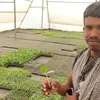From best-out-of-waste initiatives to shedding light on mental health — this week’s top stories
This week, SocialStory brought to you the tales of inspiring endeavours that powered through, undeterred by the coronavirus pandemic.
With things slowly going back to normal – whatever that may look like – projects that had been shelved because of a lack of resources are starting to whirr up from somnolence. But inspiring endeavours, that aim to make the world a slightly better place to live in, powered through, undeterred by the coronavirus pandemic.
Let’s take a look at some of these people and their projects, along with an important story on why mental health is important to think about right now.
This 26-year-old is making value out of waste, paving way for a greener environment
Right from inventing his first machine, converting vapour into water in his mother’s kitchen, and building P-bricks from industrial paper waste to becoming the ‘Recycle Man’ of India,' Binish Desai has done it all.
After building a low-cost brick that could be used for infrastructural purposes, Binish set up a manufacturing facility and a dedicated research lab to find new ways to recycle industrial waste.
Over the last one year, Binish has been able to convert around 1,996 metric tonnes of waste into usable commodities, resulting in the reduction of 3,592 tonnes of carbon emissions.

Dr Binish Desai
This teenager cycled her ailing father for 1,200 km from Delhi to Bihar
Fifteen-year-old Jyoti cycled 1,200 km from Delhi to Darbhanga, Bihar, for about a week, starting May 10, due to the lack of transportation during the lockdown.
The duo spent Rs 500 buying a bicycle, which they used to reach their destination. Despite being an e-rickshaw driver, Jyoti’s father could not help her as he had suffered a leg injury just after the lockdown.
They approached a truck driver who was travelling from Delhi but could not afford to pay him the Rs 6,000 he had demanded to help them reach Bihar. Upon their arrival in Darbhanga on May 16, the villagers offered them food and water. They were screened at the Government Middle School, Sirhulli, the next day.

Jyoti and her dad
This Delhi startup is saving water with sustainable sanitation solutions
Uttam Banerjee, Sachin Joshi, and Dr VM Chariar started Ekam Eco Solutions in 2013. The startup not only focuses on building humane and hygienic sanitation systems, but designs sustainable processes to employ them. Its line of products includes waterless urinals, natural cleaners, sewage care items, and food composting structures.
The company started by producing and selling waterless urinal systems called Zerodor, and eventually added many more products to their line-up, in addition to urinal kiosks.
Ekam’s sewage care solutions include home-grown bacterial strains and organic nutrients that can facilitate the multiplication of good bacteria, and at the same time, accelerate decomposition. Having sold about 12,000 units of waterless urinal systems, kiosks, and other sewer treatment products, the company has helped save one billion litres of water.

Ekam Eco Solutions
Coronavirus: A pandemic of anxiety and depression
According to the Indian Psychiatry Society, the number of mental health cases – including anxiety and depression – has risen 20 percent since the lockdown was first announced, mostly attributable to the decline in social activity and restricted movement.
While the virtual world is helping people stay in touch with their friends, families, and colleagues, most people have reported that they miss the physicality of meeting another human being, or being in the same space as them. For others, the fear of losing their job, being laid off, or not being able to find work is their biggest source of anxiety.
All this is adding to the pandemonium the virus has already created, and the big question now is what will get to people first – the pandemic, or the fear instilled by it?

Govt procurement portal GeM adds 4,316 products made by tribal communities
The Ministry of Commerce and Industry launched Government e-Marketplace (GeM), an online platform for public procurement, in August 2016 with the objective of creating an open and transparent procurement platform for the government.
As many as 1,000 self-help groups (SHGs) have registered on the platform, with over 500 products in categories such as handicraft, handloom and textiles, office accessories, grocery and pantry, and personal care and hygiene.

Currently, government departments, ministries, public sector units, state governments, and Central Armed Police Forces are allowed to carry out transactions through this portal.
Automobiles, computers, and office furniture are currently the top product categories. Services including transportation, logistics, waste management, webcasting, and analytical are also listed.
Edited by Aparajita Saxena









![[Tech30] This healthtech startup from Bharat saves lives with its lightweight and affordable ECG device](https://images.yourstory.com/cs/2/220356402d6d11e9aa979329348d4c3e/sunfox1p-1603969750231.png?mode=crop&crop=faces&ar=1%3A1&format=auto&w=1920&q=75)
